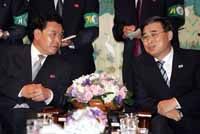NKorea seeks to resume humanitarian projects with SKorea in wake of disarmament agreement
North Korea proposed Wednesday a full resumption of humanitarian projects at the first high-level talks with South Korea in the wake of Pyongyang's nuclear test, heralding renewed reconciliation between the Koreas after the North pledged to dismantle its atomic program.

The projects apparently referred to reunions of families separated since the 1950-53 Korean War as well as rice and fertilizer aid the South has regularly given to North Korea to help support its impoverished people.
But rice and fertilizer aid were not mentioned during a 70-minute meeting in Pyongyang, according to pool reports.
The reunions were put on hold last year after the South refused to continue aid shipments following North Korea's missile tests in July. Relations further worsened after the October nuclear test, but have been revitalized since the North's Feb. 13 pledge to take initial steps toward dismantling its nuclear weapons program by shutting down its sole operating atomic reactor within 60 days.
During the meeting, the North's chief delegate, Senior Cabinet Councilor Kwon Ho Ung, defended his country's missile launches, saying they were a "legitimate right for self-defense as a sovereign nation."
The North on Wednesday also proposed resuming economic talks with the South, where the communist nation has typically sought further projects to support its isolated economy.
South Korea's top official at the talks, Unification Minister Lee Jae-joung, called on the North to quickly implement its pledges from the nuclear agreement in Beijing with the U.S. and regional powers.
Lee also called on the North to resume humanitarian projects, including the reunions of families, pool reports said, adding that the construction of a permanent reunion center for families separated since the 1950-53 Korean War should be immediately resumed.
The building project at the North's Diamond Mountain tourist resort has been on hold since North Korea's missile tests.
"We should normalize inter-Korean relations" Lee said in a keynote speech, according to pool reports.
Millions of Korean families were separated following the division of the Korean peninsula in 1945 and the Korean War. There is no direct mail, telephone service or other form of communication between ordinary citizens across the border.
Lee also called for a resolution of the issue of South Korean abductees and soldiers taken to the North during the Korean War, while proposing opening two train lines built across the heavily armed border between the Koreas within this year.
The renewed talks between the Koreas set to run through Friday come as North Korea is displaying signs that it will follow through on its disarmament pledge.
North Korea and Japan will hold talks on establishing diplomatic relations and resolving disputes March 7-8 in Vietnam, Japan's Chief Cabinet Secretary Yasuhisa Shiozaki said Wednesday. Those talks are among the provisions laid out in the nuclear deal, which also calls for the U.S. and North Korea to normalize relations.
The North's main nuclear negotiator, Vice Foreign Minister Kim Kye Gwan, passed through China on Tuesday en route to the United States, where he is expected to meet U.S. diplomats in New York, reports AP.
Also Wednesday, White House Deputy National Security Adviser J.D. Crouch was in Seoul to discuss the nuclear issue with South Korean dip has also already invited the chief U.N. nuclear inspector to visit to discuss verification of a shutdown of its atomic reactor.
Subscribe to Pravda.Ru Telegram channel, Facebook, RSS!


